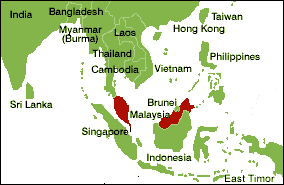|

Many civilizations have long
flourished on the Malay archipelago long before
colonial powers became interested in Malaya in the
16th century. Britain colonized the
peninsular in her efforts to exploit rubber and
other natural resources and controlled all the Malay
states by the early 1900's. The World War II which
resulted in the country being occupied by the
Japanese set the stage for the eventual independence
of the Federation of Malaya in August 31, 1957. The
British Borneo (comprising Sabah and Sarawak) and
Singapore gained their independence and joined the
federation to form Malaysia in 1963. Singapore,
however, left the Federation in 1965.
Malaysia is a member of
the Association of Southeast Asia Nation (ASEAN)
with a population of 26.13 million (2005 estimate).
At the time of her independence from Britain,
Malaysia inherited an economy dominated by two
commodities--rubber and tin. In
the 40 years
thereafter, Malaysia's
economic record had been one of Asia's best. From
the early 1980s through
the mid-1990s,
the economy experienced
a period of broad diversification and sustained
rapid growth averaging almost 8% annually. By 2004,
the per capita GDP had reached $4528. New foreign
and domestic investment played a significant role in
the transformation of
Malaysia's economy. Manufacturing grew from 13.9% of
GDP in 1970 to 31% in 2004, while agriculture and
mining, which together
had accounted for 42.7% of GDP in 1970, dropped to
9.5% and 12.6%, respectively, in 2004. Major
products include electronic components, electrical
goods, and appliances.
The country's
market-oriented economy (with a strong emphasis on
knowledge or k-economy), supportive government
policies and a large local business community that
is ready to do business with international
corporations have made Malaysia a highly competitive
manufacturing and export base. In 2004, the country
was ranked by Institute for Management Development
as the fifth most competitive country in the world
(for countries with a population of greater than 20
million), ahead of countries such as Germany, United
Kingdom, Japan and Mainland China. The remarkable
performance of the country's economy over the years
has been attributed to the country’s political
stability, the sound financial and economic policies
adopted by the government, and the efficient
management of its natural resources which include
oil and gas.
As the country entered the 21st
Century it continued to concentrate on growing the
high-technology sector by sponsoring ambitious
technology pilot projects, such as the Multi-media
Super Corridor (MSC) which launched seven flagship
applications aimed at transforming the country into
a knowledge base and paperless government and
society.
Today, utilizing its diverse resource
base (energy, raw materials, manufactured goods and
information technology products) and coupled with
healthy foreign exchange reserves and relatively
small external debt, Malaysia continues its economic
success via the promotion of both domestic and
foreign based growth engines to help Malaysia
achieve its goal of becoming a fully "developed"
nation by the year 2020.
Malaysia is now recognized as a role
model of a successful
and
most developed
Islamic nation. This success has been
attributed to a development model based on private
sector led growth, with social equity.
More information on Malaysia can be
found in the following links:
Tourism:
www.tourism.gov.my/corp/default.asp
www.geographia.com/malaysia/
Business:
www.mida.gov.my/beta/
www.matrade.gov.my/
|
